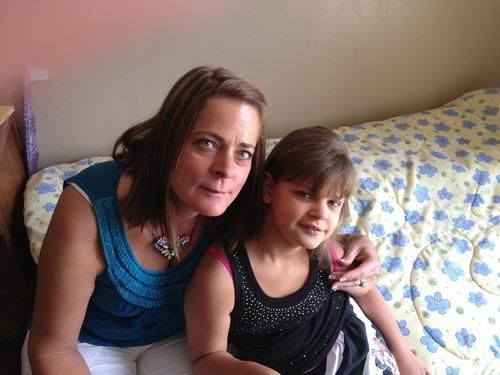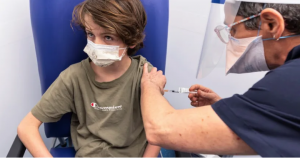Parents of Vaccine-Injured Children Speak Out: ‘The Guilt Is Huge’

Susan Lawson and her daughter Julia. Photo courtesy of Susan Lawson.
When Susan Lawson of Colorado hears parents declaring, unequivocally, that everyone should vaccinate their children because it’s perfectly safe, she says it feels “like a punch in the gut.” That’s because she’s seen another side of the story: Her daughter Julia, now 9, was left with permanent brain damage — an injury acknowledged by a federal court payout — after receiving her MMRV (measles-mumps-rubella-varicella) shot when she was a year old.
Lawson tells Yahoo Parenting that one morning, about a week after Julia received the shot, her now-ex-husband found their daughter in a terrifying state. “She was blue and cold and her body was arched, her eyes were looking in opposite directions, and she was covered in feces and vomit,” she recalls. “We thought she was dead.” She was rushed to the hospital, where doctors said she was having seizures, and she was put into a medically induced coma. Julia spent many days in intensive care and the neurology ward before being sent home with the diagnosis of encephalitis, or swelling of the brain.
Lawson, a veterinarian who had the utmost faith in medicine, had never before questioned vaccinations, and had always inoculated Julia right on schedule. But now she began to wonder. Hospital doctors dismissed any thought of a connection. But when Lawson asked a pediatrician about it, she was told it could be a possibility. Every family featured in this story received a payment by the United States Court of Federal Claims, which concluded that their rare injuries were caused by the vaccines.
“I felt shocked, bewildered, and guilty,” Lawson recalls. “We were trying to protect her, and instead I destroyed her. The guilt is huge.”
The pediatrician helped Lawson file a notice through the Vaccine Adverse Event Reporting System (VAERS), a national vaccine safety surveillance program cosponsored by the Centers for Disease Control and Prevention (CDC) and the Food and Drug Administration (FDA). Lawson then hired a vaccine-injury attorney and began what became a trying, four-year journey through the country’s National Vaccine Injury Compensation Program of the US Court of Federal Claims — a specific, no-fault forum for vaccine injuries or deaths, set up by Congress in 1986 to ensure justice for children (and, as clarified by the Supreme Court recently, to protect vaccine manufacturers from being sued). At the end of it, in 2011, Lawson was awarded nearly $1.5 million for lost future wages, future life care, and pain and suffering on behalf of her daughter, whom she describes as “an eternal toddler,” with little language skills, constant medications, and daily seizures.
“Was it justice? I mean, they could have done nothing,” Lawson says. “But I just want my kid back.”
THE RISKS
Serious vaccine injuries and deaths are few and far between, according to the CDC. “Like any medication, vaccines can cause side effects,” a spokesperson tells Yahoo Parenting through an email. “The side effects associated with getting vaccines are almost always mild (such as redness and swelling where the shot was given) and go away within a few days. Severe reactions, such as a severe allergic reaction, are rare.”
How rare? A CDC list of possible vaccine side effects notes that, for MMRV, the risk of a severe allergic reaction is “fewer than 4 per million,” while the risk of serious incidents including brain damage, it says, “occur so rarely, we can’t be sure whether they are caused by the vaccine or not.” Other possible risks range from febrile seizures (about one child in 1,250 for MMRV) to a fever of 105 or higher (about one child per 16,000 for DTaP). Notes the CDC spokesperson, “Years of testing are required by law before a vaccine is licensed and distributed. Once in use, vaccines are continually monitored for safety and efficacy. As a result, the United States currently has the safest, most effective vaccine supply in history.”
Julia and her brother during a period of hospitalization in 2008. Photo courtesy of Susan Lawson.
An overwhelming majority of Americans agree: A just released Pew Research Survey found that 83 percent of the public says vaccines for diseases such as measles, mumps, and rubella (MMR) are safe for healthy children, while about nine percent think such vaccines are not safe; an additional seven percent say that they don’t know.
A 2012 study out of Boston Medical Center, meanwhile, found that, in a random sampling of 100 VAERS reports, only 3 percent of side effects (mostly allergic reactions) were classified as definitely caused by the vaccine; 20 percent were determined as “probably” related, another 20 percent as “possibly” related and a majority were classified as “unlikely” or “unrelated.”
But, says the CDC representative, “Individuals react differently to vaccines, and there is no way to absolutely predict the reaction of a specific individual to a particular vaccine. Anyone who takes a vaccine should be fully informed about both the benefits and the risks of vaccination.” Dr. Mobeen Rathore, a Florida pediatrician and member of the American Academy of Pediatrics’ Committee on Infectious Diseases, agrees, stressing to Yahoo Parenting that, “while most people wouldn’t say there’s absolutely no risk of complications from vaccines, the benefits outweigh the risks of any complication, which are rare.” In the cases where they do unfortunately occur, he says, “It’s appropriate that the families are compensated.”
Renee Gentry, a Washington D.C.–based vaccine-injury attorney and president of the Vaccine Injury Petitioners Bar Association, believes that injuries, however rare, should be a part of the public conversation. “Vaccines are incredibly important, but we should treat them as they are — man-made pharmaceuticals that carry risk. The fear is that if you talk about that at all, people won’t vaccinate.” But not discussing it, she says, is to deny reality. “To say there is nothing unsafe about vaccines — when you can have a reaction to an aspirin — makes no sense.” She adds, “Informed consent is the underlying basis of medical care, and parents shouldn’t have to be afraid to raise questions with their doctors. Because yes, vaccine injuries are rare, but they do exist.”
RECENT INJURY CASES
Alisa Pittaluga, a pediatric occupational therapist and mother of three in upstate New York, had always felt a bit cautious when it came to vaccinations. “I’ve questioned it because of my profession,” she explains, noting that many parents over the years have expressed beliefs that their child’s medical conditions were somehow related to vaccines. Pittaluga believed in vaccinating, though, and compromised by delaying and spacing out the shots for her youngest child, Daniel, now 7. He had his first MMR shot right before he turned 4 (rather than at the CDC-recommended age of 12 to 15 months).
“He was a totally healthy 3-year-old,” she says. But within two weeks of Daniel’s shot, his mom began to notice he had bruises in strange places — on his chin, along his spine. One night, while bathing him, she saw that his whole upper body appeared to be bruised. “He looked like he’d been in a car accident — his arms and back were purple with bruises,” she recalls, adding that she became an instant “wreck,” as she’d worked with kids who had leukemia, and knew that excessive bruising was an early symptom. During a doctor’s exam to rule out the cancer, she recalls, “I was shaking from head to toe for an hour.”
Daniel Pittaluga several years ago, before receiving his shot. Photo courtesy of Alisa Pittaluga.
Leukemia was ruled out; instead, he was diagnosed with the disorder idiopathic thrombocytopenic purpura (ITP), which leads to excessive bleeding or bruising because of low blood platelets that help to clot the blood. His pediatrician mentioned that it could have been associated with his MMR vaccination — as it has been found to be, according to the CDC’s list of MMR side effects, for about 1 in 30,000 doses.
“I was devastated,” Pittaluga recalls. “I cried. I felt so guilty that I took this kid in and made him get his shot.”
Luckily, Daniel’s condition resolved itself in a year (as do the majority of MMR-related cases). But during that time, he had to be monitored with weekly blood tests, hooked up to a IV blood bag for dangerously low platelet levels, and supervised constantly to make sure he never fell down and hit his head, which could have been deadly. “The hardest part was having a 3-year-old boy who was not allowed to run or jump,” Pittaluga says. She filed a claim with the vaccine-injury court and, at the end of 2014, was awarded compensation (a sum she requested be kept private), to be put into a trust for Daniel.
Pittaluga, now pregnant with her fourth child, says she feels validated by the ruling, but forever changed. “I understand that with measles, people can have complications,” she says. “But watching your 3-year-old not being able to clot his blood for a year is much more terrifying to me.” She’s uncertain, for now, how she’ll proceed with vaccinations for her newborn, and admits to feeling “furious” regarding the anti-anti-vaxxer sentiments that dominate the media.
Harry Tembenis of Massachusetts has similar reactions to the discourse. His only child, a son named Elias, developed a seizure disorder as the result of a routine DTaP shot at four months old; he eventually died, at the age of 7, during a major seizure, while his case with the Vaccine Injury Compensation Program court was still pending. The court, after seven years, eventually determined that the vaccine caused his disorder, agreeing to pay out more than $1 million in 2013. “We got justice, we got closure,” Tembenis tells Yahoo Parenting. But he takes umbrage when he hears medical experts saying that vaccines are completely safe, noting that when they took Elias in for his shots, on schedule, they knew nothing about any possible risks. “We took the pediatrician’s word as gospel,” he says. “Unfortunately, my wife and I learned the hard way.”
Since the first Vaccine Injury Compensation Program (VICP) claims were filed in 1989, nearly 4,000 compensation awards have been made, totaling nearly $3 billion; nearly 10,000 claims, meanwhile, have been dismissed. In 2014, the court made 365 awards totaling more than $223 million (counting both petitioner payouts and attorney fees); the totals represent payouts both in which the court concedes a vaccine connection and those that were simply settlements. In cases where petitioners win concession, payout amounts vary wildly due to severity of injury and whether a child dies or not. Deaths, Gentry explains, usually receive less, because when a child survives but sustains serious injury (as in Julia’s situation), the court makes payouts for future life care and future lost wages, as well as for pain and suffering. (Although the $250,000 caps for both death and pain-and-suffering payouts have not changed since 1986, Gentry notes). To date, the majority of compensated claims stem from reactions to DTP (1,270 injuries), influenza (985), and MMR (367) vaccines.
Some injuries fall within what’s called the Vaccine Injury Table — a collection of conditions that, if they occur within a specified amount of time, “it is presumed that the vaccine was the cause of the injury or condition unless another cause is found.” Injuries that fall within the Table — including anaphylactic shock, encephalitis, chronic arthritis, and ITP (what Daniel had) — are meant to go through the court system more quickly (although it doesn’t always happen that way, as with Julia’s four-year case). Other cases become more drawn-out and complex, with many feeling “adversarial,” Gentry notes.
“There are few Table injuries, so you almost always need to get an expert,” she says, noting that there have been no Table updates since the late ’90s — although additions are currently being considered, according to a spokesperson for the U.S. Department of Health Resources and Services Administration (which oversees the VICP), including the immune disorder Guillain-Barré Syndrome in relation to the influenza shot. “And,” Gentry says, “it’s incredibly difficult to get experts, as their reputations wind up getting viciously attacked.” Attorneys often pay for experts and medical records up front and get reimbursed at the end of a case. Many petitioners wind up taking settlements, Gentry notes, rather than risk getting into what can often turn into a three-year court dispute.
“Basically, you can move cases through very quickly if you want to lose,” Gentry notes. “It’s not a workable model.”
The Pittaluga family, with Daniel at left. Photo courtesy of Alisa Pittaluga.
According to Lisa Reyes, chief deputy clerk at the US Court of Federal Claims, the Vaccine Program was created with the expectation that most cases would involve Table injuries. “About 90 percent of the petitions filed in the early days of the Program presented Table injuries, and with a few exceptions, the question of entitlement to compensation in these cases was easily resolved,” she explains to Yahoo Parenting in an email. But today, she continues, “About 98 percent of cases filed represent these off-Table claims. The effect of these changes is that more cases require evidentiary hearings, giving the perception the process is more ‘adversarial.’” As for reports about lagging cases, Reyes points to a2014 analysis of the Vaccine Program by the US Government Accountability Office, which found that “In all but 1 year since fiscal year 2009, the program has met the target for the average time to adjudicate claims (about 3.5 years).”
The case over Daniel’s ITP was one of 357 awards granted in fiscal year 2014. Others include one that garnered more than $2.3 million in compensation to a young North Carolina boy with encephalitis and permanent brain damage following a chicken pox vaccine (one of 127 awards so far in 2015); an Arkansas girl who was awarded $1.3 million for neurological damage sustained following MMR, hepatitis-A, and chicken pox vaccines; and an 8-year-old Kansas boy who, the court conceded, had a seizure disorder triggered by an underlying immune deficiency following a round of 12-month shots that included DTaP, HiB, MMR, Varicella (chicken pox), and Prevnar (pneumonia). The complicated court case took six years to reach a decision from the time it was filed in 2008.
“The doctors couldn’t stop his seizures,” says his mother Ann, a stay-at-home mom to four children (who did not want her surname printed because of family privacy concerns). “But I didn’t attribute it to the shots. My mind didn’t go there.” At some point during her rounds of visits with baffled doctors, endless tests, her son losing his ability to speak and walk, large doses of steroids, and various diagnoses ranging from epilepsy to mitochondrial encephalomyopathy (a complex genetic disorder), a neurologist posited the vaccine-link theory. That led her to hire a vaccine-injury attorney and go through the court system; she’s still awaiting a decision on the amount of damages her son — who remains on anti-seizure medication — will be awarded. But, Ann says, she’s not anti-vaccine, and has since partially vaccinated her youngest children on a delayed schedule.
“I was scared to death to do it, but I still think they’re important,” she tells Yahoo Parenting. “I do think people should be educated, and that no one should go into vaccines blindly.”
Lawson, meanwhile, has been forever changed by the reality of becoming one of the rare statistics. “I feel betrayed by the trust I had put in my pediatrician, the medical establishment, and my education,” she says. Since her daughter’s injury, she’s not allowed her son, 12, to have any of his remaining shots. “Julia qualifies for a medical exemption. My son, however, does not. I exercise my personal belief exemption for him, for obvious reasons,” she says. “If vaccines become mandated, am I really expected to risk this happening to him? I won’t. They can fine me, jail me, whatever they want. I’m not vaccinating him. We will move out of the country if necessary. That’s how seriously I take this. It has to be a choice.”
Please follow @YahooParenting on Facebook, Twitter, Instagram, and Pinterest. Have an interesting story to share about your family? E-mail us at YParenting (at) Yahoo.com.
Source: https://www.yahoo.com/news/parents-of-vaccine-injured-children-speak-out-110904439577.html








